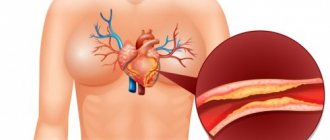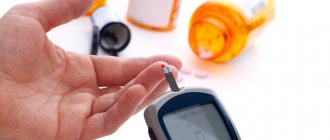What does cholesterol look like?
Many people think of cholesterol as fat and believe that the fattier the food, the more cholesterol it contains. This point of view is only partly justified. Cholesterol is found in the blood and looks like a viscous substance. Cholesterol cannot be considered exclusively harmful, because it is consumed by the body in the process of producing hormones and forming cell membranes. To varying degrees, cholesterol is involved in the functioning of the immune, nervous and digestive systems, so a certain amount of cholesterol must be contained in the body at all times. Another thing is that keeping it within acceptable limits is not always easy.
Excess cholesterol
tends to deposit on the inner walls of arteries.
At first, this is an imperceptible process, but gradually, due to the cholesterol layer, the diameter of the artery narrows, and blood begins to pass through it worse. In places where the vessel narrows, a dense formation is formed from the cholesterol layer, which is commonly called a “ cholesterol plaque
.”
Cholesterol plaques not only almost completely block the flow of blood through the vessel, but also reduce its elasticity. The process of cholesterol formation is called “ atherosclerosis
”.
By themselves, single cholesterol plaques do not pose a serious health hazard, but if you do not take action, over time there will be too many of them. In addition, cholesterol plaque
- This is the initial stage of
thrombus
. Often blood clots form where atherosclerotic plaques were located. The danger of a blood clot is that it completely seals the vessels and can block the flow of blood to vital organs. If a blood clot occurs in a vessel supplying the heart, a person may have a myocardial infarction, and if blood flow stops in a vessel supplying the brain, the person may suffer a stroke.
Does high cholesterol cause death?
Cholesterol itself is not considered deadly. Complications caused by high cholesterol levels can lead to death. We have already named some of them. Atherosclerosis can trigger the development of coronary heart disease, and one of the complications can be myocardial infarction, stroke, acute thrombosis and other diseases. The list can be large and is determined by which arteries were affected.
What you need to know about cholesterol?
The content of the article
Cholesterol is a lipoprotein. Lipoprotein is a combination of fats and proteins. Most of the cholesterol (80%) is produced in the liver, 20% of it enters the body with food. A person needs no more than 300 mg of cholesterol per day.
Cholesterol performs several important functions:
- responsible for the formation of cell membranes, maintaining their strength and elasticity;
- participates in the production of bile by the liver;
- participates in the synthesis of vitamin D;
- participates in the synthesis of sex hormones;
- protects the nervous system;
- participates in metabolic processes.
Is all cholesterol the same?
Cholesterol is found in the blood, but does not dissolve in it. Cholesterol is carried throughout the body by lipoproteins. High density lipoprotein (HDL) molecules
move cholesterol from the arteries to the liver. Later, this cholesterol is excreted from the body and is not deposited on the walls of blood vessels. Such cholesterol is considered “good” because it not only does not increase, but reduces the risk of developing cardiovascular diseases.
Another type of cholesterol carried by low-density lipoprotein (LDL) molecules
from the liver throughout the body. In peripheral tissues, cholesterol gradually settles on the walls of blood vessels, resulting in the formation of atherosclerotic plaques. It is important for a person to monitor and prevent an increase in the level of low-density lipoproteins, or “bad” cholesterol.
Another form of lipids that provide the body with energy, but in large quantities can be harmful, are triglycerides. They are synthesized by the liver or enter the body with food, and then pass into the blood. A high content of triglycerides in the blood is also undesirable, since it can disrupt the functioning of the circulatory system.
Causes of very low cholesterol
Causes of very low cholesterol may include:
- acute infections;
- sepsis;
- extensive burns;
- fasting and a very strict diet;
- eating too many fatty acids (omegas).
Very low cholesterol can be a sign of diseases:
- hypolipoproteinemia;
- hyperthyroidism;
- liver cancer and other oncological diseases;
- liver cirrhosis, especially in the later stages;
- chronic anemia;
- bone marrow pathologies;
- chronic pulmonary pathology.
What increases cholesterol?
Increased cholesterol levels can be due to various factors. The first thing you should pay attention to is your diet
.
If a person has a slight increase in cholesterol levels, doctors usually recommend that they eat less foods high in saturated fat, but certain health problems can also contribute to high cholesterol levels. For example, chronic renal failure or decreased thyroid function. Some people may have high cholesterol levels “naturally” and be inherited. This genetic abnormality is called “ familial hypercholesterolemia
”.
When shaping your diet, you need to remember that cholesterol is found only in products of animal origin. This argument is often made in favor of a plant-based diet by vegetarians. However, this does not mean that if animal food is excluded, the rest of the diet can be uncontrolled. Food fried in vegetable oil and products containing palm oil can also have a negative effect on lipid metabolism.
Five unexpected reasons why cholesterol jumped
So why might cholesterol rise? The reasons may be the most unexpected.
Photo: GLOBAL LOOK PRESS
The “total cholesterol” indicator means nothing
“Cholesterol is a kind of “scarecrow” of modern medicine,” says our regular expert, nutritionist Lyudmila Denisenko. - This is on the one hand. On the other hand, it is a way to enrich pharmaceutical monsters, because drugs to lower blood cholesterol - statins - always cost a lot.
In fact, even babies need cholesterol, and they get it from their mother's milk. Cholesterol is the “building blocks” of our brain, hormones, nerve endings, cell membranes...
And when we are called to “lower cholesterol levels,” we need to understand why and what kind of cholesterol we need to “lower.”
It is important to understand that we get only about 20% of the cholesterol we need from food, the remaining 80 is synthesized in our body. On average, each adult normally contains about 2 grams of cholesterol per kilogram of body weight. That is, with a weight of 70 kg - about 140 g of cholesterol.
Remember that there is no “good” or “bad” cholesterol in your plate; it becomes such in our liver, kidneys, adrenal glands, gonads, intestines and skin - the places where cholesterol formation occurs.
When patients start telling me that their therapist or cardiologist recommended a diet because their cholesterol is “higher than normal,” I immediately warn that the “total cholesterol” indicator means nothing! You need to know which cholesterol – “good” or “bad” – is responsible for this increase.
Say no to statins
“Good” cholesterol - HDL (high-density lipoprotein) can be arbitrarily high, although laboratories also give the upper limit of its “norm”. But if “bad” cholesterol is increased - LDL and LDL (low and very low density lipoproteins) - then you need to take care of reducing it. Just one request - no statins! Even if your doctors insistently offer them to you.
(Cardiologists, of course, may have their own opinion about prescribing medications. But even they clarify: statins are prescribed not for high cholesterol, but for a high risk of vascular diseases, and the risk is assessed taking into account cholesterol - Ed .)
Statins, like doctors who have not delved very deeply into the topic, sometimes do not understand which cholesterol is “good” and which is “bad”, and reduce everything. Google it and see how many scientific studies have now appeared about the dangers of statins, that they can lead to senile dementia and even Alzheimer’s disease.
So why might cholesterol rise? The reasons may be the most unexpected.
1. It’s not about food, but about heredity or place of residence
Why is it so unfair - someone can eat sandwiches with butter and caviar, topped with scrambled eggs, and still remain healthy until old age, while someone literally on water and bread has that very “high” cholesterol level that is blamed for all mortals? sins - atherosclerosis, strokes, heart attacks and other diseases of civilization?
And most importantly - what to do? Should you urgently go on a diet, eliminating all foods containing cholesterol from your diet? Take your time, because our body, sensing a deficiency of cholesterol in the incoming food, will simply begin to synthesize it more! The facts speak about this, because even vegans - people who have completely abandoned animal foods (and as you remember, cholesterol is found only in animal products) - hypercholesterolemia - an increase in cholesterol levels in the blood - is quite common. All the reasons for this have not yet been clarified; heredity, stress, bad habits, and even place of residence play a role here. It is known, for example, that residents of the Far North, whose diet is dominated by animal products, have virtually no atherosclerosis.
The cause of increased cholesterol is quite often diseases of the liver and intestines, because this is where endogenous cholesterol is synthesized.
2. Hormone deficiency is to blame
Most doctors recognize that one of the main reasons for increased cholesterol is... deficiencies. First of all, there is a deficiency of sex hormones. I already said above that cholesterol is extremely important for the synthesis of sexual hormones, but with age their production decreases, which means that “extra” cholesterol appears. What to do? Compensate for deficiency of sex hormones. Hormone replacement therapy from a certain age will also help reduce cholesterol, because the body, realizing that the level of these hormones is normal, will stop synthesizing “extra” cholesterol.
Another deficiency is thyroid hormones, which, alas, is becoming more common. It can also be adjusted perfectly and our doctors are excellent at doing it.
3. Not enough vitamin D
What other deficiencies cause high cholesterol? Vitamin D deficiency (and it is observed in at least 80% of the inhabitants of Russia, and even in sunny southern Sochi. The reason is banal - sunscreens, rare exposure to the open sun in the most favorable morning and pre-sunset hours, a shortage of products containing this vitamin (in first of all - fresh sea fish and seafood). How to compensate? It is clear that in Sochi you can sunbathe in the sun and eat black sea mullet, but it is not a fact that your intestinal microflora is in order and synthesizes inactive vitamin D from inactive vitamin D (from the sun and food) its active form. What should Muscovites or Murmansk residents do? Take vitamin D in the form of medications. Everyone, from infants to very old people. Maintenance dose - 100 thousand IU per month, therapeutic dose (for a deficiency of the vitamin detected in the blood) will be prescribed only a doctor.
4. Ate little fish
Another deficiency is omega-3 fatty acids. Again, where in our diet is fresh sea fish from the northern seas, rich in this essential nutrient? Not the suspiciously red-orange salmon from our supermarkets, raised on farms on artificial feeds and additives, and having virtually no omega-3 fatty acids, but small fresh fish - mackerel, anchovies, herring - “grazed” in the open sea and not frozen on our tables? If you are unlucky enough to be born and live in the northern seas, there is a way out - omega-3 supplements, and only those in which the content of EPA + DHA (don’t worry about their full name, remember these abbreviations) is above 50% per capsule and obtained exactly from this small fish. How to check if you have enough omega? Donate blood for omega-3 index. And it should ideally be 12-13, and for most of us it is about 3... High cholesterol is also affected by a deficiency of iron, iodine, vitamin B12...
5. And went too far with sugar
But the same high cholesterol is also affected by... excess! But not fat in foods, which we are constantly afraid of (remember the Eskimos and their seal fat in their diet), but sugar! It is sugar, starting from refined white sugar, which you like to add to tea, and ending with “hidden” sugar, which is found in almost all industrially processed products - bread, cheese, sausage, canned food, baked goods, sweets, juices, drinks...
The food basket of today's Russian contains only refined sugar - 24 kg per year. “Hidden” sugar is almost impossible to count. And it is sugar that causes plaques in blood vessels. Attaching to hemoglobin, sugar molecules turn it into “hedgehogs” - glycated Hb - which “scratch” the walls of blood vessels, and in order to patch up these wounds, our body begins to synthesize more cholesterol, which is a kind of putty for these mucosal defects. This is how atherosclerotic plaques appear.
ON A NOTE!
Eggs and lard - yes
But it’s time to justify eggs, butter, lard, which are accused of all mortal sins! The same eggs contain choline, which removes “bad” cholesterol, and lard contains arachidonic acid, which is extremely necessary for us, which has the same effect. I am silent about butter, which contains vitamins A, D, E, C, B, calcium, phospholipids (building material for cells, especially nerve cells) and essential amino acids.
But don’t rush to run to the market tomorrow for fatty cottage cheese and sour cream; excess fat in your diet will increase not cholesterol, but the amount of fat – subcutaneous and internal. But excess weight is almost 100% high cholesterol.
Is it worth using vodka to “clean vessels”?
Do not listen to “folk” advice that a glass of vodka “cleanses” blood vessels. She doesn't clean anything. In addition, alcohol abuse leads to fatty liver degeneration, one of the causes of increased cholesterol in the blood. But resveratrol in red wine helps remove “bad” cholesterol and is a strong antioxidant that protects our organs and tissues from free radicals - the cause of inflammation and even cancer. But remember the dose - 150 - 200 ml per day, no more.
IMPORTANT!
What diet will really lower cholesterol?
Already from the above, it is clear that these are fish and seafood containing vitamin D and omega-3, as well as complete protein - rich in choline, essential amino acids and, in particular, methionine. Choline and methionine are used by the body to synthesize phospholipids, in particular lecithin, which forms hydrophilic lipoprotein complexes with cholesterol. Lipotropic substances also prevent fatty infiltration of the liver, thereby ensuring its normal functioning. Lean meats, lean fish, cottage cheese, skim milk, egg whites, legumes (soybeans, peas), spinach, oatmeal, and herring are rich in choline. There is a lot of methionine in lamb, pike perch, cod, legumes (soybeans, peas, beans), and buckwheat. For more details, see below.
SPECIFICALLY
The following products and dishes made from them are recommended:
— Vegetables, fruits, berries (fresh, frozen and dry), mushrooms.
— Milk and some dairy products in their natural form (low-fat, but not low-fat cottage cheese, curdled milk, kefir, fermented baked milk).
— Buckwheat, oatmeal, wheat cereals, legumes, pasta made from durum wheat.
— Meat (veal, beef), skinless poultry (turkey, chicken).
- Low-fat varieties of fish (cod, perch, pike, pike perch), and 2-3 times a week - fatty varieties of fish containing omega-3 (wild salmon, herring, mackerel, mackerel, sardines, etc.)
— Unrefined vegetable oil (linseed, olive) and butter.
- 2-3 times a week - eggs and dishes made from them.
— Seafood (shrimp, mussels, squid, scallop, seaweed).
— Coarsely ground rye and wheat bread.
And don't forget about physical activity! Not exhausting training, but feasible, but regular, let it be what you like - walking, walking at a fast pace, dancing, swimming, rollerblading or cycling, skating or skiing - but be sure to do it regularly! And better - in the fresh air.
Do healthy people need to monitor their cholesterol?
Often people begin to monitor certain indicators when problems appear and their health worsens, but prevention is always better than cure. The concept of “healthy person” is too general. You may not have liver or metabolic problems now, but that doesn't mean you won't have them in the future. People with identified lipid metabolism disorders should regularly undergo cholesterol tests, but others should not check the strength of their body.
If your diet often contains fatty foods, high-calorie foods, and in general you like to indulge in sweets, then sooner or later this will increase your cholesterol. Other cardiovascular risk factors may also have an impact. As a result, you risk getting atherosclerosis with all the attendant consequences.
Cholesterol norm
If, according to the test results, your cholesterol is normal, then there is no serious cause for concern. Provided you follow the rules of a healthy diet and a healthy lifestyle, the next examination can be done in a few years.
If the cholesterol level is elevated ( from 5 to 6.4 mmol/l or more
), then it’s worth monitoring it every six months to observe the dynamics. At the same time, you need to reconsider your diet, remove foods that increase cholesterol, and also give up bad habits: smoking and drinking alcohol. Your doctor should warn you about additional risks associated with the presence of concomitant diseases.
over 6.4 mmol/l is considered a high-risk level.
. This indicator indicates the need for specialized treatment, since there is a high probability of developing coronary heart disease and other cardiovascular complications. The treatment program should be drawn up by a doctor based on the tests performed, including identifying the level of LDL, HDL and triglycerides.
Normal cholesterol levels
On average, a healthy person contains about 2 g of cholesterol per 1 kg of body weight. If we talk about laboratory standards, then this is 3.6-7.8 mmol/l. However, when deciphering the results, it is important to understand what kind of cholesterol we are talking about. There are the following varieties:
- HDL – high-density lipoproteins, “good” cholesterol, which utilizes excess “bad” cholesterol;
- LDL - low-density lipoproteins, the main carriers of cholesterol in the blood, have a second name - “bad” cholesterol;
- VLDL are very low density lipoproteins that transport endogenous lipids.
A high level of the last two types is a predisposing factor for the development of atherosclerosis.
What cholesterol is considered high? Any (general, “good” or “bad”), if its concentration is above 5 mmol/l. If previously there were no limits for HDL, now scientists have come to the conclusion that its optimal level for men is 1.9 mmol/l, for women – 2.4 mmol/l. It is important that its concentration does not fall below 1.5 mmol/l, as this will cause an increase in LDL cholesterol.
If the level of “bad” cholesterol is within 5-6 mmol/l, then it is moderately elevated. If it reaches 7 mmol/l or more, it is life-threatening.
Studies have confirmed that extremely high cholesterol in men increases the risk of premature death by 106%. For women, this figure will be 68%. But the situation is no better in the case of extremely low HDL levels. An excessive decrease in “good” cholesterol also adversely affects health and increases the likelihood of early mortality.
Risk group for atherosclerosis
Atherosclerosis
- an insidious disease that develops gradually. Cholesterol level is an indirect indicator of the risk of developing atherosclerosis, but some categories of people need to be tested for cholesterol at certain intervals. The following recommendations are given:
- men over 40 years old;
- women over 45 years old;
- people with diagnosed diabetes;
- overweight people;
- people with diseases of the thyroid gland, kidneys and high blood pressure;
- smokers;
- people who lead a sedentary lifestyle.
It is important to understand that at the first stage of development, atherosclerosis has no visible specific manifestations. A person may not even be aware of the developing disease and the problem with cholesterol. Therefore, doctors recommend regularly donating blood for biochemical analysis.
What factors influence high cholesterol levels?
If a person did not experience health problems at a young age, this does not mean that they cannot appear after menopause. This condition is more discussed as one of the life cycles of a woman, however, in men there is also an age when the hormonal background changes significantly and the whole body begins to work differently. Therefore, with the onset of your 40th birthday, medicine recommends being more attentive to your body and undergoing timely preventive examinations.
Poor nutrition is the main factor affecting cholesterol levels. The lack of fresh plant foods in the daily diet does not allow the intestines to be cleansed and freed from toxins and other harmful substances. Blood, due to the predominance of fatty and animal foods, becomes thicker, losing its rheological properties. As a result, its ability to nourish tissue cells, including oxygen, decreases. Cholesterol builds up on the walls of blood vessels, trying to block the lumen.
When should you start monitoring your cholesterol?
It's never too early for prevention. It’s better to get used to monitoring your health from a young age, then it will present you with fewer unpleasant surprises. It is especially important to pay attention to your health after 40 years of age
, this is true for both men and women. In men, coronary heart disease may begin to develop earlier than in women. This is explained by hormonal levels. Women of childbearing age have more “good” cholesterol in their bodies, while in men the preponderance may lean toward “bad” cholesterol. After menopause, women's bad cholesterol levels may also begin to rise along with their triglyceride levels.
If previously it was believed that atherosclerosis mainly affects mature and elderly people, now the disease is diagnosed in younger patients, so it would be reasonable to start controlling cholesterol levels at 30-35 years of age. If the analysis shows that everything is normal, a re-check can be carried out after 3-4 years, but if the cholesterol level is elevated or there is a genetic predisposition to the development of heart and vascular diseases, then it is worth checking the cholesterol level more often.
Do children suffer from high cholesterol?
Cholesterol levels in children, as a rule, do not rise above normal, but they can also be at risk if hereditary hypercholesterolemia is found in their family. In this case, the child will be registered with a pediatric cardiologist from an early age. A cholesterol test should be done at the age of two years, and then repeated periodically.
What is cholesterol?
Doctors name two types of cholesterol, conventionally defining them as “good” and “bad.” Good cholesterol is high-density, an alcohol that is soluble in fat tissue. The cell walls of internal organs and blood vessels contain good cholesterol, which ensures the usefulness of their structure.
Bad cholesterol is low in density. It forms plaques on the inner walls of blood vessels. Elevated levels of bad cholesterol lead to atherosclerosis. Because of it, a tendency to heart attack and stroke develops. In addition, obstruction of blood flow leads to varying degrees of hypoxia, because red blood cells cannot deliver oxygen molecules to organs and tissues.
Symptoms of high cholesterol
It is possible to determine the exact level of cholesterol in the body only after an analysis, but there are symptoms that may indicate the presence of disturbances in the functioning of the body. This will not allow you to make a diagnosis, but it should be a reason to visit a lipidologist or cardiologist. Make an appointment for a preventive appointment if:
- physical activity or excessive anxiety provokes the appearance of aching pain in the chest;
- even minor physical activity causes a feeling of lack of oxygen;
- you begin to get tired faster, and fatigue is accompanied by a feeling of heaviness in the chest area;
- you often have a headache for no reason, there is noise in your ears, you feel oxygen starvation to the point of fainting.
If you notice the symptoms described, make an appointment with your doctor. It will be enough to visit a therapist so that he can conduct a preventive examination and, if necessary, refer you to other specialized specialists.
The diagnosis of atherosclerosis is difficult to make without biochemical and instrumental examination, so be prepared for the fact that you will have to undergo a series of tests. The examination usually begins with a blood test and an ECG.
. Then, depending on the results obtained, a treatment program is prescribed, if necessary. The patient’s blood is usually taken from a vein, but if a quick result is needed, it can be obtained using the express method by drawing blood from a finger. To obtain more accurate results, it is recommended to donate blood on an empty stomach.
What can high blood cholesterol lead to?
It may not lead to anything, or it may even lead to changes in the functioning of blood vessels, says Shakirova. In particular, to atherosclerotic damage to the vascular wall of the heart muscle, brain vessels, lower limbs, as well as the formation of atherosclerotic plaques. And these plaques, in turn, can cause sudden cardiac arrest, heart attack, stroke, angina, brain disorders and even lameness. It all depends on the clinical picture of the patient.
Article on the topic Cleaning blood vessels. How to get rid of cholesterol plaques
How does high cholesterol manifest?
There are no symptoms indicating increased levels of bad cholesterol. This is the main danger of the consequences. Only regular preventive examinations can indicate risks and give timely recommendations to eliminate the first signs of plaque formation on the walls of blood vessels.
Without donating blood for analysis, it is impossible to determine how much cholesterol is in the blood. This can only appear simultaneously with a stroke, a detected disease of the cardiovascular system, or diagnosed atherosclerosis. It is not always possible to restore a high quality of life to a patient after an acute condition caused by uncontrolled cholesterol. Often, a heart attack or stroke is diagnosed at autopsy, and the cause of this condition is a large number of plaques on the walls of blood vessels.
Therefore, you should not wait for the manifestation of high cholesterol levels. The smartest thing to do is to save your life by having your blood tested every six months.










